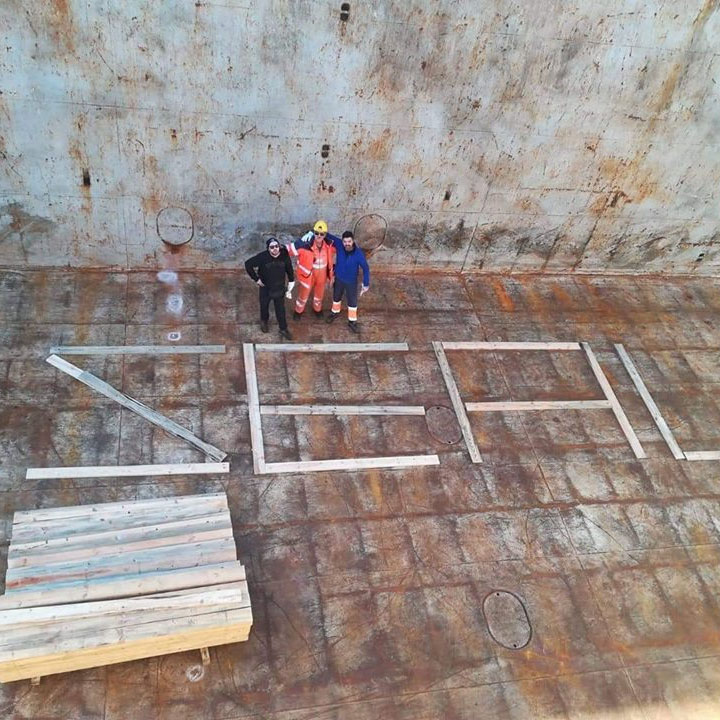Portugal // António Mariano and SEAL want to ruin Christmas~ 7 min

Notice: SEAL is gathering funds for the striking precarious workers of the port of Setúbal.
The voyage of the “ghost ship”
At 6:38AM on November 22, the cargo ship Paglia arrived at the port of Setúbal. Despite having its itinerary hidden from the system used to track ships, the dockers of Setúbal were already waiting for it. They called a gathering at the port, appealing to the presence and solidarity of other forces. A shameful police operation was waiting for them, a product of the collaboration between the port leasers and the Portuguese State.
Their goal was to neutralize any workers’ opposition, break the strike picket and to allow scabs to enter the terminal and proceed with loading Volkswagen cars produced at the Autoeuropa factory. It was all prepared in order to reduce the strike’s impact on the German giant. Up until that moment, most of the media coverage about the strike focused precisely on the matter of Autoeuropa, as we exposed on the 21st.
The operation featured workers being dragged by police and culminated with the scab carrying bus entering the port. Little is known about its manifesto, but it is estimated at 50 passengers. Given their weak productivity, it is presumed that they had no previous experience. It is also known that they received 500€ for three days work. If we add up the costs of the police apparatus and the fact that three ships went unworked while all this was going on, we get an idea of the effort made by the State and Operestiva to ensure that the “national interest” was safeguarded. Plus, we also get a speech by the Prime Minister attacking the workers for defending their dignity at work and their right to strike:
There is something we can’t ignore: there is a union at the port of Setúbal that, fortunately, is not disseminated in many other ports and which is a very strong conditioner to its good operation. Fortunately, it was possible to secure conditions for operations to begin, and they are working out well.
– Prime Minister António Costa
This clearly demonstrates the true objective behind the actions of bosses and the government: to keep the precarious and cheap labor economy inviolate.
Carrying less cargo than initially expected, the ship departs from Setúbal at around 9:33PM on November 24 (data from the Marine Traffic platform). It heads towards the port of Emden in Germany, where it arrives on November 28 at 12:40PM (local time).
Symbolic international solidarity
Shortly after, at that same port, a workers’ assembly was ongoing. Deliberately scheduled to overlap with the beginning of operations in the Paglia, it was called by the workers’ councils of the Emden Autoterminal and the local Volkswagen factory. Its purpose was to delay the ship’s unloading operations and attempt to influence the resolution of the conflict. IG Metall (the biggest metalworkers’ union in the world) representatives were present, along with the German ver.di union of the IFT and EFT federations.
A press release emitted by these two federations expressed its solidarity towards the workers of the port of Setúbal in the struggle against precarious work. The press release and a few demonstrations of support through social networks didn’t go past words and symbolism. Barring the delay in starting the unloading of the ship, there were no other disturbances in the expected course of operations. After they were successfully concluded, the ship headed to other ports on November 30.
SEAL attempts to destroy the Christmas spirit
Meanwhile, the negotiations carried out by SEAL, the bosses and the government arrive at a dead end. The bosses demand the end of the national strike on overtime, along with the end of the “eventuals” strike at the port of Setúbal. However, the former relates to abuses and reprisals against SEAL members in other ports, while the latter is the only one pertaining to the conflict in Setúbal.
As neither the union nor the workers were willing to abandon their comrades in other ports to secure their own benefit, the union made a counter-proposal:
(…) the suspension of the strike on overtime only at the port of Setúbal, for 15 days, if during the same period the government pledges to gather the social partners of the ports where there are said persecutions, and such irregular situations are verified and eliminated, namely: the harassment of our members at Leixões and Caniçal (along with the Agreement which was ripped by the Lisbon operators).
The proposal was refused. The union is still open to negotiations.
Meanwhile, the dirty tricks and media intoxication continued. In an incredible display of cretinous behavior, Operestiva (one of the operators at the port of Setúbal) and the Ministry of the Sea both emitted, respectively, letters to the workers and a press release worthy of an adolescent copying another’s homework. They include such pearls as:
(…) [we were intent on] immediately beginning the collective work contract negotiations, to be finalized by the end of the year, allowing everyone to enjoy a more comfortable Christmas as well. (…)
The intractable position of the Union President (…) makes evident a complete disdain for the situation of the eventual workers of Setúbal and clearly demonstrates his intent (…) to use them in service of the union struggle at the ports of Leixões and Caniçal.
– Operestiva, in a letter to the workers dated November 28
(…) there was no reason for the workers not to have their situation regularized today and be able to enjoy a more peaceful Christmas. (…) it was not possible because their representatives, instead of discussing the situation of their Setúbal workers, preferred to discuss the situation at the ports of Leixões and Sines. (…)
To make it clear, the government can not and will not take part in a war between unions. And we regret that the workers of Setúbal are being used by their representatives as a bargaining chip in a union power struggle.
-Ministry of the Sea, on November 30
So, being incapable of mobilizing the hostility of public opinion towards the striking precarious dockers through repeatedly shouting “Autoeuropa” during prime-time, the bosses and the government have adopted a “ruined Christmas” and “union war” line. Both are completely absurd if we take into account that the striking dockers have had their Christmas ruined by precarious labor relations and bosses’ unions for 20 years, a period during which both port operators and half a dozen governments never seemed particularly phased by the matter.
It should also be noticed that the letter from Operestiva is dated November 28, while the negotiations ceased on the 30th. One should thus assume that Operestiva is capable of piercing the veil between present and future and this allowed them to discover how negotiations would end, two days before they did. Otherwise, we must consider that the negotiations were a farce intent on vilifying SEAL from the get go, knowing full well that the union would not accept terms that meant betraying their own.
Big boss Mariano
Meanwhile, the SIC channel aired a report on November 30 in which the heads of the Leixões union accused SEAL of “union terrorism”. Their members then covered themselves in ridicule by affirmatively answering the reporter’s cynical questions, such as “did you fear for your life [when dealing with SEAL members]?” The report uses all the dirty tricks in the book. Hand-picked images to show the supposedly violent nature of the SEAL dockers, sinister background soundtrack, biased script, anonymous defamatory testimonies and baseless accusations; nothing in it could be called journalism – it was built to specification to support the narrative of a “war between unions” at the orders of “big boss” António Mariano and his henchmen. From atop his throne of human skulls, he manipulates the feckless precarious dockers in order to fill the union’s pockets. A timeless classic.
The next day, the National Federation of Port Workers’ Unions emits a press release that echoes the government and bosses’ narrative about a nefarious SEAL that places its union animosities before the interests of workers. It also adds the following pearl:
(…) [at our ports] there aren’t the levels of precariousness present in SEAL ports, the cargo volumes grow, as does the number of workers with contracts, unlike what succeeds at SEAL ports (…)
Who would have guessed, bosses prefer ports controlled by their unions! Will wonders never cease?




